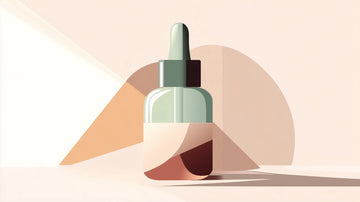The sun's UV rays damage your skin by triggering free radicals and oxidative stress, which are responsible for wrinkles, brown spots, and an uneven complexion. Antioxidants, such as vitamins C and E, act as natural shields by neutralizing these free radicals and preserving your skin's health.
Key Points:
- Why it's important: UV rays cause cellular mutations and accelerate skin aging.
- The best antioxidants : Vitamin C (citrus, berries), Vitamin E (vegetable oils), Beta-carotene (carrots, sweet potatoes), Polyphenols (green tea, berries).
- Ideal routine: Apply an antioxidant serum in the morning, followed by an SPF 30+ sunscreen.
- Diet: Eat fruits and vegetables rich in antioxidants to strengthen your skin's protection.
Antioxidants do not replace sunscreen, but when combined with a good routine and a balanced diet, they effectively protect your skin from the harmful effects of the sun.
How Antioxidants Protect the Skin
The Science of Antioxidants
Antioxidants play a crucial role in protecting the skin against free radicals produced by UV rays. These molecules act as natural shields, stabilizing free radicals to prevent them from causing damage to skin cells. This process helps preserve cellular structure and contributes to maintaining a youthful-looking skin.
The Main Antioxidants for the Skin
| Antioxidant | Main Function | Source |
|---|---|---|
| Vitamin C | Protects against UV and stimulates collagen | Citrus fruits, berries |
| Vitamin E | Neutralizes free radicals, regenerates cells | Vegetable oils |
| Beta-carotene | Protects against UV, anti-inflammatory effect | Orange vegetables |
| Carotenoids | Reduces oxidative stress | Colorful fruits and vegetables |
Antioxidant Defense Mechanisms
Antioxidants do not work alone. They work together to provide a more effective defense on several levels:
- Damage prevention: They neutralize free radicals before they attack the skin cells.
- Repair and support: They help repair damaged cells while strengthening the skin's natural defense mechanisms.
Products that combine several antioxidants provide enhanced protection against external aggressions. This combination improves the skin's natural ability to protect itself and regenerate.
Now that their importance is clear, it's time to explore how to incorporate them into your skincare routine to make the most of them.
Vitamin C, Vitamin E, Antioxidants for Healthy Skin
Use of Antioxidants in Skin Care
Now let’s move on to how to incorporate antioxidants into your skincare routine to get the most out of them.
How to Choose Antioxidant Products
Some antioxidants, such as vitamins C and E, prove particularly effective when included in well-formulated serums. Dr. Dendy Engleman, dermatologist, emphasizes the importance of additional protection:
Even the best sun protection covers about 98% of UV rays, so those 2% can cause damage when considering the cumulative effect on our life.
Look for products containing stable forms of vitamin C (such as tetrahexyldecyl ascorbate), vitamin E, niacinamide, or green tea extracts rich in EGCG for optimal results.
The Good Way to Apply Antioxidants
To maximize their effectiveness, apply the antioxidants in the morning after cleansing your skin. Then, follow with a moisturizer and a sunscreen with at least SPF 30. Here is the recommended order:
| Step | Product | Waiting time |
|---|---|---|
| 1 | Gentle cleanser | - |
| 2 | Antioxidant Serum | 1-2 minutes |
| 3 | Moisturizer (if necessary) | 1 minute |
| 4 | Sun Protection | - |
Combine Antioxidants and Sun Protection
Combining antioxidants and sun protection is an excellent way to protect the skin from external aggressions. A study from Acta Dermato-Venereologica showed that Vitamin C combined with a UVA sunscreen improves protection against UV.
"During the day, antioxidants and sun protection work in synergy to shield the skin from environmental free radicals and UV damage." - Dr. Lian Mack, dermatologist
Here are some practical tips for optimal protection:
- Apply an antioxidant serum every morning.
- Use a sunscreen with at least SPF 30.
- Reapply your sunscreen every 2 hours.
- Avoid mixing vitamin C with exfoliating acids, as this could reduce its effectiveness.
Finally, do not forget that antioxidants are not limited to topical care. A diet rich in antioxidants can also strengthen your skin's natural defense.
Antioxidants in Your Diet
The Best Dietary Sources of Antioxidants
Antioxidants, combined with appropriate care, help the skin defend itself against UV rays. Here is where to find them in your diet:
| Antioxidant | Food Sources |
|---|---|
| Vitamin C | Citrus fruits, kiwis, strawberries |
| Vitamin E | Almonds, sunflower seeds |
| Beta-carotene | Spinach, carrots, sweet potatoes |
| Polyphenols | Berries, green tea |
Fruits such as citrus, kiwis, and strawberries, rich in vitamin C, promote collagen production. Almonds and sunflower seeds, full of vitamin E, help neutralize free radicals. Orange vegetables, thanks to beta-carotene, offer natural protection against UV. Finally, the polyphenols present in berries and green tea slow down the signs of skin aging.
Antioxidant Supplements Guide
If you plan to supplement your diet with antioxidant supplements, consider these tips:
- Choose brands verified by independent laboratories.
- Prefer supplements that combine several types of antioxidants.
- Always adhere to the dosages recommended by the manufacturers.
Antioxidant-Rich Meal Ideas
Here are some meal ideas to incorporate more antioxidants into your day:
- Breakfast: a porridge topped with blueberries and almonds.
- Lunch: a spinach salad with pieces of orange.
- Dinner: grilled salmon accompanied by sweet potato.
To fully enjoy the benefits of antioxidants, opt for raw or lightly cooked fruits and vegetables. Seasonal products are often richer in protective nutrients.
Adopting a varied and balanced diet remains the best way to strengthen your skin's natural defense against UV. Antioxidants play a key role, but their effectiveness also depends on the right combinations and quantities.
Optimizing the Use of Antioxidants
When to Apply Antioxidants
Use your antioxidant products in the morning, before exposing yourself to the sun. They act as a protective layer against external aggressions. Combine them with a broad-spectrum sunscreen for even more effective protection.
Mix the Antioxidants
Some antioxidants work better together. For example, combining vitamins C and E enhances protection against UVA and UVB rays. Ferulic acid adds a layer of stability and improves their effects. Polyphenols and carotenoids, on the other hand, provide additional defense by protecting cells comprehensively.
Precautions and Limitations
To safely enjoy the benefits of antioxidants, follow these tips:
- Go gradually: If your skin is sensitive, introduce one antioxidant at a time to avoid reactions.
- Avoid excesses: Follow the recommended doses, especially for dietary supplements. Too many antioxidants can be counterproductive.
- Consider your situation: For example, smokers should avoid consuming large amounts of beta-carotene, as it can increase the risk of lung cancer.
For sensitive skin, opt for suitable products such as the Mousse Solaire FPS 50+ from SOLEILBIAFINE, which combines sun protection and gentle antioxidants for the skin.
By choosing the right products and following these precautions, you will optimize the benefits of antioxidants while effectively protecting your skin.
Key Points on Antioxidants and Sun Protection
Antioxidants play an important role in protecting the skin against the harmful effects of the sun. They help preserve collagen and elastin, which are essential for keeping skin firm and resilient.
For effective protection, it is crucial to regularly use a variety of antioxidant sources. Research shows that combining different antioxidants improves the defense against damage caused by UV rays, thereby offering more comprehensive protection.
Here are three complementary approaches for optimal protection:
| Method | Advantages | Usage Guidelines |
|---|---|---|
| Topical Application | Direct and localized protection | Apply before sun exposure with sunscreen |
| Food | Internal Support | Consume foods rich in vitamins C and E, such as fruits and vegetables |
| Supplements | Additional reinforcement | To be used as a supplement, according to specific recommendations |
It is important to note that antioxidants do not replace sunscreen. However, when combined with sun protection, particularly through antioxidants such as vitamins C and E, they significantly strengthen the skin's defense against UV rays and oxidative stress.
By combining these different approaches, you can not only protect your skin from sun damage, but also contribute to its overall health.
Frequently Asked Questions
After seeing how to incorporate antioxidants into your routine and diet, here are some answers to common questions about their role in protecting against the sun.
What foods can help protect against UV rays?
Some foods rich in antioxidants may provide natural support against the effects of UV rays. Here are some examples:
| Food | Main benefits |
|---|---|
| Tomatoes | Contain lycopene |
| Sweet Potatoes | Rich in beta-carotene |
| Almonds and seeds | Provide vitamin E, which combats free radicals |
| Green tea | Provides protective polyphenols |
| Blueberries | Contain flavonoids |
| Watermelon | Source of lycopene and promotes hydration |
| Green vegetables | Rich in beta-carotene and other antioxidants |
"The isolated intake of a single antioxidant molecule provides no protection, but the combination of several antioxidants offers moderate protection against sunburn." - Pr Marie-Thérèse Leccia, Dermatologist, CHU Grenoble.
Research, such as the SU.VI.MAX study, has shown that combining different antioxidants can reduce the harmful effects of sun exposure. For best results, rely on a varied diet that incorporates several of these foods.






